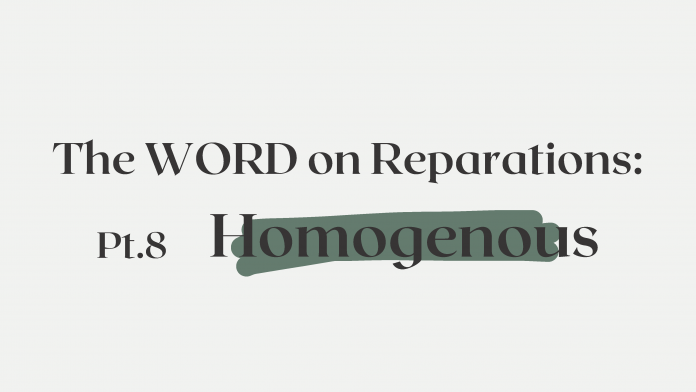These are three independent thoughts from Latinx members of the Reparations Committee.
Vanessa:
Latinx is not a racial category nor homogenous; it is an ethnicity that encompasses a vast array of identities descended from Latin America. Black Latinx identities are especially marginalized within Latinx communities. Due to Latin America’s colonial history, Black Latinx individuals still face colorism and racism by non-Black Latinx peers.
Representation within Latinx media is heavily skewed to favor white Latinx people, as they reflect idealized, Eurocentric standards. The lack of visibility of Black Latinx culture also perpetuates the stereotype that Black Latinx people don’t exist. This stereotype dismissed the history of slavery within a majority of Latin America which gave way to Afro-Mexican, Afro-Salvadorans, Afro-Dominicans, Haitians and many more Black communities. When it comes to the College of William and Mary, the College tends to categorize all Latinx identities into one group. The issue with homogenizing the Latinx community is that it dismisses and overlooks Black Latinx identities. So while more white Latinx students may classify themselves as Hispanic/Latinx, the study body ends up skewed to white Latinx instead of a diverse population. One of the most important ways to fix this issue is to disaggregate the data of racial categories (Asian American Student Initiative has a great post explaining the way the College does this).
Changing the way we see data can allow us 1) to accurately represent the College’s campus and 2) acknowledge the visibility of a minority group at a predominantly white institution.
Victoria:
I first want to start by acknowledging that I am a white Latinx woman on campus and do not want to speak for the experience of others. This article is based on my experience and what I have witnessed during my three years on campus.
Most Latinx students admitted to the College are predominantly white or white-passing, but Black and Brown Latinx students remain a small percentage of the Latinx students admitted. There is a lack of visibility of Black Latinx students and their experiences. It is not the student’s fault, but something those in the admissions process have overlooked and ignored. Just admitting a small percentage of Black Latinx students is not enough. Successful admission of more Black Latinx students is hindered by the lack of accessibility to resources. Due to a lack of Black Latinx students on campus, it is difficult to incorporate this demographic of students into the few organizations we have on campus.
Another issue is the lack of awareness and education available to the campus community with regard to this population. The few discussions, speakers and classes available on Black Latinidad are mostly attended by Black and Latinx students on campus. As someone who has taken a few classes in the Latin American studies department, I am excited to see my non-POC peers taking classes there. A good amount of Latin American studies majors and minors are white students on campus. Outside of the classroom and required academic activities, some of these students never interact with multicultural organizations, donate to fundraisers supporting BIPOC communities and people, or immerse themselves within the communities they study.
Chance:
I’ve lost count of how many times I’ve been on the receiving end of furrowed brows, side glances, and outright confusion when I have shared my Latinx identity. My cultural pride was, more often than not, met with a bombardment of questions demanding that I prove myself. It got to the point where I wouldn’t check the Latinx/Hispanic box on a census or an exam. It was easier for me to deny myself of my culture before someone else did. If I asserted that I already didn’t feel like I deserved to claim my identity — no one else could take it from me.
Not being able to speak Spanish played a role in my exclusion; but, more than anything, it was how I looked. They’d look me up and down, seeing my brown skin and coily hair, and basically ask that I draw a family tree so they could “be sure” I was Latinx. My experiences, as well as those of other Black Latinx people, show how harmful it is to treat Latinx as a racial identity or a monolith when it’s neither. This misconception results in non-white Latinx people needing to jump through hoops just to be proud of who we are. Latinx’s obsession with homogeneity, questioning every person who doesn’t look like a J-Lo or a Sofia Vergara, separates an already divided community. The idea of homogeneity chooses who does and does not get to exist in the community.
I’ve said this many times before, but I will say it again: Latinx is not a race. There is no singular way to exist as a Latinx person. I am an example of how Black Latinx people can struggle with their identity, but I want to be clear: that struggle is my journey and homogeneity enforced by anti-Blackness will no longer take a backseat.
Vanessa Cartagena-Clemente ’22 is double majoring in global studies with a concentration in Latin American studies and gender, sexuality and women’s studies. Vanessa serves on the community side for the Reparations Committee and is also the 2020-2021 secretary for the Latin American Student Union and the newest member of Hermandad de Sigma Iota Alpha, Inc. Email Vanessa at vcartagenaclem@email.wm.edu.
Victoria Morales ’22 is double majoring in government and kinesiology with a concentration in public health. Victoria is also a Class of 2022 senator serving on the Reparations Committee and is also the Membership Director for Phi Mu and member of the Latin American Student Union. Email Victoria at vmorales@email.wm.edu.
Chance Jimenez ’23 is double majoring in government and history with a concentration in African American studies. Chance serves on the community side of the Reparations Committee and is the incoming Outreach Coordinator for the NAACP as well as a member of the Black Student Organization, Camp Kesem and Mock Trial. Email Chance at cjimenez@email.wm.edu.


[…] Ver Fuente […]